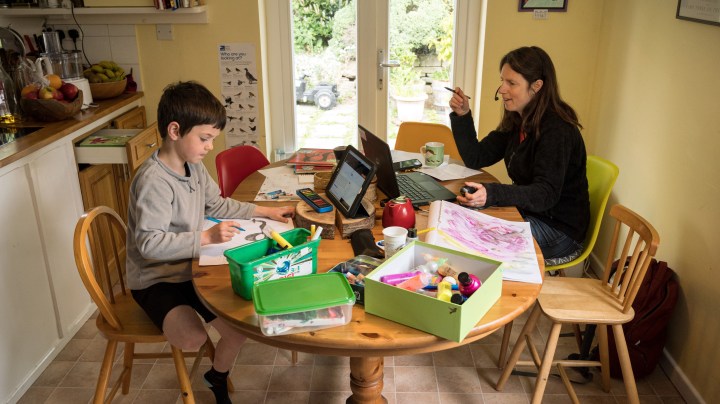
With COVID gaps on millions of resumes, do they still carry stigma?
With COVID gaps on millions of resumes, do they still carry stigma?

There’s been so much disruption of people’s career trajectories over the last 18 months.
Millions of Americans were furloughed or laid off, and millions more had to leave their jobs to take care of kids or aging parents.
In both cases, women were particularly hard hit. Their labor force participation rate is lower than it’s been in 30 years, which is creating a lot of gaps on resumes if and when those people try to find new jobs. But the meaning of such career pauses could be changing.
Kristen Kehrer, a Boston-area data scientist, used to dread those uncomfortable questions every time she applied for a job.
“They’d look at my resume and say, ‘You know, I see that you have a three-year gap here. What was that about?'” she said.
Early in her career, Kehrer took a break to get sober — not something she wanted to discuss with a potential employer years later.
“I worried about it all the time,” she said. “And honestly, I lied because I didn’t have anything good to say about it.”
So, when the pandemic forced her to take another break from her career to care for her 2-year-old and run a remote-learning pod for her 5-year-old, she was terrified.
“I literally thought I was toast,” she said. “I thought people were going to judge me, that I was the person who couldn’t hack working and a pandemic.”
That anxiety is understandable, said Michelle Keefe, who runs a boutique staffing firm called MomUp, which specializes in placing mothers. She knows the difficulty many women encounter trying to reenter the workforce after time away, “partly from my own experience, and partly from the women in my community after speaking to so many of them with these incredible backgrounds, advanced degrees, great experience,” she said.
While employers may have legitimate concerns about whether a candidate who’s been out of an industry is up to date with her skills, Keefe said, a resume gap — particularly for moms — also carries more intangible baggage.
“Are they not as committed? Are they going to take another break when they have another child? Are they going to be asking for more flexibility?” she said.
What happened during the pandemic could reinforce that stereotype: Millions of women had to step back from work because of caretaking responsibilities. But the sheer volume of job disruptions could make it easier for people to be open about them, said Catherine Fisher, a career expert at LinkedIn.
“Before the pandemic, we know that workers, and women in particular, were really fearful of discussing these gaps,” she said. “And one silver lining of the pandemic is that it’s really destigmatized these career gaps.”
LinkedIn has added an option to profiles to help explain those interruptions, like allowing members to specify that they were stay-at-home parents during certain periods on their career timelines.
“It’s a way to really characterize your time and what you’ve been doing while you were taking care of other life priorities,” she said.
Traditionally, the idea of admitting to having life priorities other than work was kind of risky, said Betsey Stevenson, an economist at the University of Michigan. But the pandemic has started to change things.
“Our attitude about caregiving and managing our lives with work, I think, has really been shook up as a nation,” she said. “My hope is that there’s a lot more empathy out there.”
But perhaps the biggest change going forward won’t be in how gaps are perceived, but whether people will need to take them.
“Employers have learned something about the benefit of flexibility,” Stevenson said, “giving people that flexibility so that they actually hold on to their job, rather than taking those gaps, rather than actually leaving.”
Kehrer said she has definitely shifted how she thinks about her COVID resume gap.
“If somebody asks me what I was doing, I was a caretaker, I was a facilitator of remote learning,” she said. “I feel perfectly comfortable being honest about this.”
And it hasn’t slowed her career down. She recently got a gig analyzing data for a health care company.
There’s a lot happening in the world. Through it all, Marketplace is here for you.
You rely on Marketplace to break down the world’s events and tell you how it affects you in a fact-based, approachable way. We rely on your financial support to keep making that possible.
Your donation today powers the independent journalism that you rely on. For just $5/month, you can help sustain Marketplace so we can keep reporting on the things that matter to you.

















